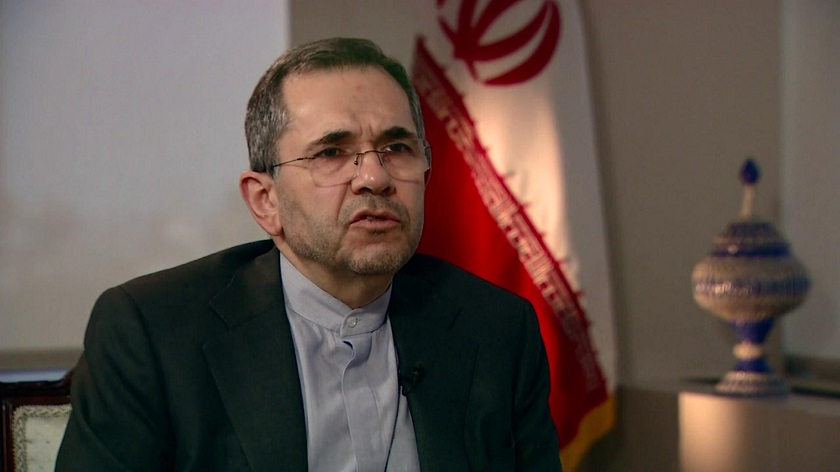Alwaght- Iran recognizes Syria’s right to self-defense in the face of Israeli attacks, the Islamic Republic’s ambassador to the United Nations said on Wednesday urging the UN Security Council to strongly condemn the regime’s acts of aggression against the Arab country.
Addressing a monthly UN Security Council session on the situation in Syria, Majid Takht-Ravanchi said Israel continues its acts of aggression and terrorist attacks on Syria as well as violations of the Arab country’s sovereignty and territorial integrity by occupying parts of it.
“The Security Council must unequivocally condemn the Israeli aggression and terrorist attacks against Syria. We recognize Syria’s legitimate right to self-defense under international law and the United Nations Charter,” he said.
“We strongly condemn Israel’s repeated violations of Syria’s sovereignty and territorial integrity, including recent terrorist attacks on civilians and civilian infrastructure, particularly the attacks on Damascus International Airport on June 10th, which resulted in the cancellation of all flights, including humanitarian flights.”
Syria and the Israeli regime are technically at war due to the latter’s 1967-present occupation of Syria’s Golan Heights.
The regime maintains a significant military presence in the occupied territory, which it uses as one of the launchpads for attacks on Syrian soil.
The regime's attacks on Syria have grown significantly in scale and frequency after 2011 when Syria found itself in the grip of foreign-backed terrorism.
Elsewhere in his address, Takht-Ravanchi reiterated Iran's stance on avoiding military approaches and solving the crisis in Syria through diplomatic channels.
"As Iran has repeatedly emphasized, there is no military solution to the Syrian crisis. The crisis should be settled peacefully and in accordance with the principles of international law, especially full respect for national sovereignty and territorial integrity of countries," he said.
He emphasized that Iran supports Syria cross-border aid mechanism if it does not violate Damascus's sovereignty and territorial integrity and heed legitimate concerns of the Syrian government.
The top diplomat said the Constitutional Committee plays a crucial role in the political settlement of the Syrian crisis, adding an Iranian delegation was in Geneva, acting in concert with all parties to advance its aims.
Iran welcomes the Constitutional Committee's announcement that its next session would be held on June 25-29, he noted.
The Islamic Republic, he said, emphasizes that the committee must act in full accordance with its internal regulations and free from outside pressure or artificial deadlines and be a truly Syrian-led and -owned process.
The Iranian envoy further noted that guarantors of the Asana Format have expressed earlier this month their commitment to advance a long-lasting political process that works in line with Security Council Resolution 2254 (2015).
He said Iran would continue its efforts to help release detainees and called on all parties to support the humanitarian endeavor, adding that the recent amnesty announced by Syrian President Bashar al-Assad was a valuable contribution to peace.
Provision of humanitarian aid is essential and must not be prevented by politics, but be executed with full respect for Syria’s sovereignty, territorial integrity and national unity.
Israel must be compelled to cease its attacks on Syria: Sabbagh
Addressing the same meeting, Syria's Permanent Representative to the United Nations Bassam Sabbagh voiced regret at the Security Council’s failure to condemn Israel’s aggression in Syria, particularly against the Damascus International Airport, and said Israel must be compelled to cease its attacks on his country.
Sabbagh also condemned Israel’s ongoing military attacks against Syria, which jeopardize security in the region.
He said the Syrian government has achieved significant progress in the last few months, demonstrating its keenness to support national reconciliation and local settlements.
President Assad's amnesty decree issued in April benefitted a host of detainees, he added and said diplomatic missions abroad and the Ministry for Foreign Affairs have received applications and requests in that regard.
Syrian institutions continue their efforts to strengthen the legal architecture, he said, noting that a number of important decrees and laws have been enacted to regulate areas such as the possession of weapons and ammunitions, amending the penal code, and abolishing life imprisonment with hard labor.
The Syrian government is committed to removing all impediments for the safe, voluntary and dignified return of refugees to their places of origin, Sabbagh emphasized.
He urged the countries that prevent Syrian refugees from returning to their homeland to stop those practices, emphasizing the need to lift unilateral coercive measures imposed on Damascus.
Citing the concluding statement from the eighteenth Astana Meeting on Syria, he stressed the importance of taking new actions to combat terrorism and refusing all attempts to create a new reality on the ground by autonomous initiatives in northeast Syria.
He welcomed the release of detainees and abductees in June, expressing appreciation for the support of Russia and Iran in this regard.
The Syrian diplomat said his country makes its own decisions based on its own will, adding that it will spare no effort toward constructive relations with all countries of the world.



























